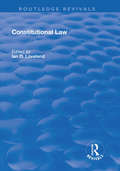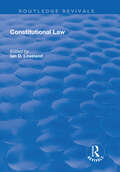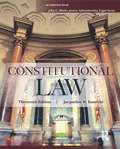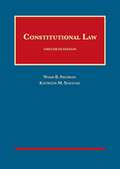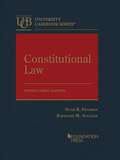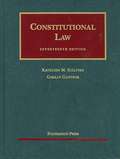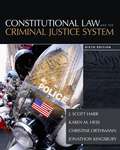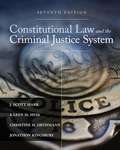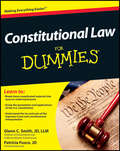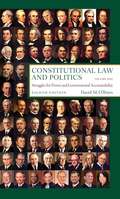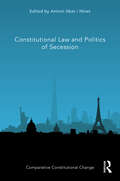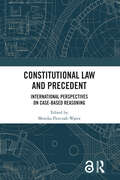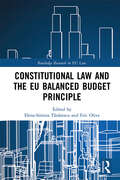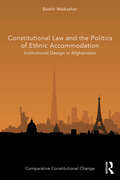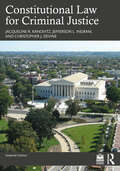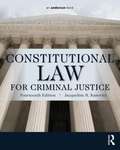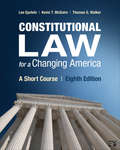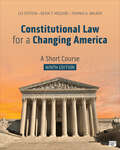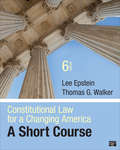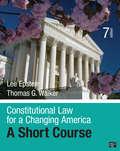- Table View
- List View
Constitutional Law (Routledge Revivals)
by Ian D. LovelandThis title was first published in 2000: This volume of essays explores a number of fundamental constitutional law questions in a variety of historical and jurisdictional contexts. The contributions focus on the role to be played by courts and legal principles in the resolution of major political controversies and on the progressive development of constitutional jurisprudence in countries sharing a broadly common law legal tradition. The guiding theme pervading the collection is an attempt to measure the legitimacy of judicial (in-)activism when courts are faced with difficult political choices on matters such as slavery, internment, racism and voting rights and radical economic policies and are also confronted with the requirement to attach concrete meanings to such abstract concepts as the separation of powers and the rule of law.
Constitutional Law (Routledge Revivals)
by Ian D. LovelandThis title was first published in 2000. This volume of essays explores a number of fundamental constitutional law questions in a variety of historical and jurisdictional contexts. The contributions focus on the role to be played by courts and legal principles in the resolution of major political controversies and on the progressive development of constitutional jurisprudence in countries sharing a broadly common law legal tradition. The guiding theme pervading the collection is an attempt to measure the legitimacy of judicial (in-)activism when courts are faced with difficult political choices on matters such as slavery, internment, racism and voting rights and radical economic policies and are also confronted with the requirement to attach concrete meanings to such abstract concepts as the separation of powers and the rule of law.
Constitutional Law (Thirteenth Edition)
by Jacqueline R. KanovitzPresents an up-to-date analysis of critical constitutional issues. Special attention is given to issues of greatest concern to criminal justice personnel _ detention, arrest, search and seizure, interrogations and confessions, self-incrimination, due process, and right to counsel. Also includes constitutional aspects of criminal and civil liabilities of justice personnel, and constitutional and civil rights in the workplace. Part II presents key cases to assist in interpreting the constitutional provisions.
Constitutional Law (University Casebook Series)
by Noah Feldman Kathleen SullivanThis casebook provides a unique combination of clearly structured and lawyerly coverage of the cases with rich historical, theoretical, and philosophical materials that illuminate the development of our constitutional law. The note materials and questions in the casebook make it easy to structure classes and promote lively discussion. And comparative examples from the constitutional law of other nations are provided throughout. <p><p> The Twentieth Edition is an updated version of this classic casebook, adding new materials on the Supreme Court’s most recent decisions on the First Amendment, Equal Protection, Substantive Due Process, Separation of Powers, and Federalism.
Constitutional Law (University Casebook Series)
by Noah Feldman Kathleen SullivanThis casebook provides a unique combination of clearly structured and lawyerly coverage of the cases with rich historical, theoretical, and philosophical materials that illuminate the development of our constitutional law. The note materials and questions in the casebook make it easy to structure classes and promote lively discussion. And comparative examples from the constitutional law of other nations are provided throughout. The Twenty-first Edition is an updated version of this classic casebook, adding new materials on the Supreme Court’s most recent decisions on the First Amendment, Equal Protection, Substantive Due Process, Separation of Powers, and Federalism.
Constitutional Law (University Casebook)
by Gerald Gunther Kathleen M. SullivanThe Seventeenth Edition provides comprehensive coverage of all areas of constitutional law, including judicial review, separation of powers, federalism, due process, equal protection, free speech, and religious liberty. It emphasizes constitutional law as a species of law, and aims to enable students who use it to practice constitutional law as lawyers. It also seeks to illuminate the historical, theoretical, and philosophical background that bears on constitutional law and informs its practice. The 17th edition thoroughly revises, updates and streamlines this classic casebook, emphasizing contemporary problems in areas from the war on terror to new uses of the Internet.
Constitutional Law 2: The Constitution of India, 1950
by P. Jaganathan Usha Jaganathan J. P. ArjunThe book on "Constitutional Law 2" primarily covers various aspects of the Indian Constitution, focusing on the division of powers between the Union and States, federalism, and key constitutional provisions. It addresses themes like the legislative, administrative, and financial relationships between different levels of government. Case laws and doctrines such as *pith and substance*, *territorial nexus*, and *colourable legislation* are examined to highlight the interpretation and application of constitutional principles. The book also includes solved problems and past exam questions for law students, making it a valuable resource for understanding the structure and functioning of the Indian legal system.
Constitutional Law And Politics: Volume Two Civil Rights And Civil Liberties
by David M. O'BrienConstitutional Law and Politics has more material—including case excerpts, concurring and dissenting opinions, and topical introductions—than any other casebook. Each case is set in its historical and political context, with social and technological factors relevant to the study of Supreme Court rulings noted throughout. Special feature boxes make constitutional law come alive with additional insights on the history, context, and personalities behind Supreme Court deliberations and decisions.
Constitutional Law And The Criminal Justice System
by Kären M. Hess J. Scott Harr Jonathan Kingsbury Christine H. OrthmannMarket-leading CONSTITUTIONAL LAW AND THE CRIMINAL JUSTICE SYSTEM, 6th Edition, uses real-world illustrations, succinct case summaries, and proven learning tools to equip readers with a solid understanding of our often-complex Constitution and criminal justice system. Avoiding confusing "legalese", the book features more than 200 plainly written, summarized cases that introduce readers to the most influential and relevant cases. It also thoroughly covers the Fourth and Fifth Amendments, exploring their application to issues relevant to criminal justice: reasonable search and seizure, double jeopardy, and testifying against oneself. The sixth edition includes expanded discussions of the First and Second Amendments as well as cutting-edge coverage of such high-profile topics as immigration, terrorism/homeland security, death row, and many others.
Constitutional Law And The Criminal Justice System (Mindtap Course List Series)
by J. Scott Harr Jonathan Kingsbury Kären Matison Hess Christine OrthmannUnrivaled in its simplicity and skill-building pedagogy, market-leading CONSTITIONAL LAW AND THE CRIMINAL JUSTICE SYSTEM, 7e thoroughly explains the complexities of the U.S. Constitution and the criminal justice system. <P><P>Extremely student friendly, the text avoids legalese and is packed with real-world illustrations. Its unique--and effective--pedagogical framework for concept mastery helps readers develop a solid understanding of key issues and concepts, while more than 200 plainly written, summarized cases introduce readers to pertinent cases in a non-intimidating manner. <P><P>The text devotes considerable time to the Fourth and Fifth Amendments, exploring their application to issues relevant to criminal justice: reasonable search and seizure, double jeopardy, and testifying against oneself. In addition, the Fifth Editions cutting-edge coverage includes such high-profile topics as immigration, terrorism/homeland security, death row, and more.
Constitutional Law Cases in Context
by Josh Blackman Randy E BarnettConstitutional Law: Cases in Contextplaces primary emphasis on how constitutional law has developed since the Founding, its key foundational principles, and recurring debates. By providing both cases and context, it conveys the competing narratives that all lawyers ought to know and all constitutional practitioners need to know. Teachable, manageable, class-sized chunks of material are suited to one-semester courses or reduced credit configurations. Generous case excerpts make the text flexible for most courses. Cases are judiciously supplemented with background readings from various sources. Innovative study guide questions presented before each case help students focus on the salient issues, challenging them to consider the court’s opinions from various perspectives, and suggesting comparisons or connections with other cases.
Constitutional Law For Dummies
by Patricia Fusco SmithDiscover the ins and outs of Constitutional lawAre you a student looking for trusted, plain-English guidance on the ins and outs of Constitutional law? Look no further!Constitutional Law For Dummies provides a detailed study guide tracking to this commonly required law course. It breaks down complicated material and gives you a through outline of the parameters and applications of the U.S. Constitution in modern, easy-to-understand language. Critical information on the Constitution's foundations, powers, and limitationsA modern analysis of the Constitution's amendmentsDetailed information on the Supreme Court and federalismExplaining outdated governmental jargon in current, up-to-date terms, Constitutional Law For Dummies is just what you need for quick learning and complete understanding. Students studying government will also find this to be a useful supplement to a variety of courses.
Constitutional Law and Politics Volume One: Struggles for Power and Governmental Accountability
by David M. O’BrienConstitutional Law and Politics, Eighth Edition, has more material―including case excerpts, concurring and dissenting opinions, and topical introductions―than any other casebook. Each case is set in its historical and political context, with social and technological factors relevant to the study of Supreme Court rulings noted throughout. Special feature boxes make constitutional law come alive with additional insights on the history, context, and personalities behind Supreme Court deliberations and decisions. <p><p> New cases added for the Eighth Edition include: Boumediene v. Bush, about presidential power, detainees in the War on Terror, and the writ of habeas corpus; Medellin v. Texas, about presidential power, treaties, and federalism; Citizens United v. Federal Election Commission, a landmark case about corporate contributions in federal elections and First Amendment rights; United States v. Williams, about regulating the Internet; Safford Unified School Dist. No. 1 v. Redding, about strip searches of students; and Herring v. United States, about the Fourth Amendment exclusionary rule.
Constitutional Law and Politics of Secession (Comparative Constitutional Change)
by Antoni Abat i NinetThis collection presents an analysis of the concept of secession and its constitutional accommodation alongside an assessment of the effects of secession in constitutional and international law. The work proposes a new approach and insights into the existing literature that fill a gap from multidisciplinary and transdisciplinary perspectives. The book approaches the topics of secession, constitutionalism, and their relationship from both theoretical and empirical perspectives, including the analysis of particular secessionist examples, such as Catalonia, the Basque Country, Tigray, the Palestinian minority in Israel, Bosnia and Herzegovina, and the Mapuche Nation, from a comparative constitutional perspective. Elucidating these issues from different methodological and conceptual perspectives produces novelties in the scientific and constitutional debate. The interplay between constitutions, constitutional law, and secession is indeed explored from philosophical, socio-legal, but also from strict constitutional law outlooks. Written by constitutional and public international law experts, the book will be of interest to students, academics, and researchers working in the areas of constitutional law, legal theory, theory of the state, philosophy of law, and political science.
Constitutional Law and Precedent: International Perspectives on Case-Based Reasoning
by Monika Florczak-WątorThis collection examines case-based reasoning in constitutional adjudication; that is, how courts decide on constitutional cases by referring to their own prior case law and the case law of other national, foreign, and international courts. Argumentation based on judicial authority is now fundamental to the resolution of constitutional disputes. At the same time, it is the most common form of reasoning used by courts. This volume shows not only the strengths and weaknesses of such argumentation, but also its serious methodological shortcomings. The book is comparative in nature, with individual chapters examining similar problems that different courts have resolved in different ways. The research covers three types of courts; namely the civil law constitutional courts of Germany, Italy, Poland, Lithuania, and Hungary; the common law supreme courts of the United States, Canada, and Australia; and the European international courts represented by the European Court of Human Rights and the Court of Justice of the European Union. The authors are distinguished scholars from various countries who specialise in constitutional justice issues. This book will be of interest to legal theorists and practitioners, and will be especially insightful for constitutional court judges.
Constitutional Law and the EU Balanced Budget Principle (Routledge Research in EU Law)
by Elena-Simina TănăsescuExploring the balanced budget rule as an economic standard and as a legal principle, this book explains the context and content of the balanced budget rule and presents a critical appraisal of its impact on legal systems, political institutions and social values, and particularly an evaluation of its constitutionalization in the European and national legal systems. Examining a range of perspectives on the balanced budget rule as a legal principle, a series of chapters investigate the feasibility and effectiveness of the balanced budget rule. The book considers the impact this may have on the separation of powers within the state, on democratic decision-making, on the European social model and on the protection of fundamental social rights within the European Union. It suggests that this impact goes beyond the ethical issue of the public debt considered as a burden placed on future generations, and beyond injunctions imposed by international financial institutions on national public finances. The transfiguration of fiscal discipline from an economic requirement into a legal rule demanding a balanced budget embodies a challenge to the political nature of the budgetary process while creating the flexibility needed in order to further fiscal federalism within the European Union. This book argues that the balanced budget rule is nothing more than it has always been: an instrument for devising public policies in a rational manner, a tool for conceiving qualitative choices regarding the well-being of citizens.
Constitutional Law and the Politics of Ethnic Accommodation: Institutional Design in Afghanistan (Comparative Constitutional Change)
by Bashir MobasherThis book explores whether the legal and political institutions of Afghanistan were able to incorporate diverse ethnic groups into the political process. Ethnic accommodation has gained central stage in the literature on institutional design and democratic consolidation. However, some divided societies are more explored than others, and Afghanistan is one understudied country that is critically important for testing and improving our theories of institutional design in a democratizing, plural society. This work examines the Constitution of 2004 and those provisions of electoral laws and political party laws that together devised Afghan political institutions including those of the presidential system, unitary government, electoral systems as well as the party system. It argues that due to their incongruence in design and effects, the Afghan political institutions failed to fully accommodate ethnic groups in the political process. This book adopts a holistic approach, while also paying careful attention to the details of each of the individual pieces of political institutions designed by the Constitution of 2004. Taken together, this approach yields insights into the boundaries and interactions of institutional design and how their interactions hinder or advance ethnic accommodation in varying contexts. The book will be essential reading for academics, researchers and policy makers interested in constitutional law and politics.
Constitutional Law for Criminal Justice
by Jefferson L. Ingram Jacqueline R. Kanovitz Christopher J. DevineConstitutional Law for Criminal Justice, Sixteenth Edition, offers criminal justice professionals the training they need to recognize the constitutional principles that apply to their daily work. Jacqueline R. Kanovitz, Jefferson L. Ingram, and Christopher J. Devine provide a comprehensive, well-organized, and up-to-date analysis of constitutional issues that affect the U.S. justice system. Chapter 1 of Part I summarizes the organization and content of the Constitution, the Bill of Rights, and the Fourteenth Amendment. The next eight chapters cover the constitutional principles that regulate investigatory detentions, traffic stops, arrests, use of force, search and seizure, technologically assisted surveillance, the Wiretap Act, interrogations and confessions, self-incrimination, witness identification procedures, the right to counsel, procedural safeguards during criminal trials, First Amendment issues relevant to law enforcement, and capital punishment. The final chapter covers the constitutional rights of criminal justice professionals in the workplace, their protection under Title VII of the Civil Rights Act, and their accountability under 42 U.S.C. § 1983 for violating the constitutional rights of others. Part II contains abstracts of key judicial decisions exemplifying how the doctrines covered in earlier chapters are being applied by the courts. The combination of text and cases creates flexibility in structuring class time. This book makes complex concepts accessible to students in all levels of criminal justice education. The chapters begin with an outline and end with a summary. Key Terms and Concepts are defined in the Glossary. Tables, figures, and charts are used to synthesize and simplify information. The result is an incomparably clear, student-friendly textbook that has remained a leader in criminal justice education for more than 50 years. The accompanying Instructor and Student Resources website provides free digital materials designed to test student knowledge and save time when preparing lessons. Resources include: Student access to practical quizzes including multiple-choice and true-or-false questions, and case studies with interactive questions and answers to test and apply knowledge A downloadable comprehensive study guide, glossary, and appendix including the text of the United States Constitution to enhance understanding of each chapter alongside study Step-by-step Instructor Guides and premade lesson slides that correspond to the chapters in an editable format to saving valuable time on lesson preparation Instructor access to test-bank questions for further exam practice
Constitutional Law for Criminal Justice (14th Edition)
by Jacqueline R. KanovitzCriminal justice professionals often do not receive the training they need to recognize the constitutional principles that apply to their daily work. Constitutional Law for Criminal Justice offers a way to solve this problem by providing a comprehensive, well-organized, and up-to-date analysis of constitutional issues that affect criminal justice professionals. Chapter 1 summarizes the organization and content of the Constitution, the Bill of Rights, and the Fourteenth Amendment. The next eight chapters cover the constitutional principles that regulate investigatory detentions, traffic stops, arrests, use of force, search and seizure, technologically assisted surveillance, the Wiretap Act, interrogations and confessions, self-incrimination, witness identification procedures, the right to counsel, procedural safeguards during criminal trials,#65533;First Amendment issues relevant to law enforcement, capital punishment, and much more. The final chapter covers the constitutional rights of criminal justice professionals in the workplace, their protection under Title VII of the Civil Rights Act, and their accountability under 42 U. S. C. #65533; 1983 for violating the constitutional rights of others. Part II contains abstracts of key judicial decisions exemplifying how the doctrines covered in earlier chapters are being applied by the courts. The combination of text and cases creates flexibility in structuring class time. Constitutional Law for Criminal Justice makes complex concepts accessible to students in all levels of criminal justice education. The chapters begin with an outline and end with a summary. Key Terms and Concepts are defined in the Glossary. Tables, figures, and charts are used to synthesize and simplify information. The result is an incomparably clear, student-friendly textbook that has remained a leader in criminal justice education for more than 45 years.
Constitutional Law for a Changing America: A Short Course
by Thomas G. Walker Lee J. Epstein Kevin T. McGuirePolitical factors influence judicial decisions. Arguments and input from lawyers and interest groups, the ebb and flow of public opinion, and especially the ideological and behavioral inclinations of the justices all combine to shape the development of constitutional doctrine. Drawing on political science as much as from legal studies, Constitutional Law for a Changing America: A Short Course helps you realize that Supreme Court cases are more than just legal names and citations. With meticulous revising, the authors streamline material while accounting for recent landmark cases and new scholarship. Ideal for a one semester course, the Eighth Edition of A Short Course offers all the hallmarks of the Rights and Powers volumes in a more condensed format. Students and instructors benefit from the online Con Law Resource Center which houses the supplemental case archive, links to CQ Press reference materials, a moot court simulation, instructor resources, and more.
Constitutional Law for a Changing America: A Short Course
by Thomas G. Walker Lee J. Epstein Kevin T. McGuirePolitical factors influence judicial decisions. Arguments and input from lawyers and interest groups, the ebb and flow of public opinion, and especially the ideological and behavioral inclinations of the justices all combine to shape the development of constitutional doctrine. Drawing on political science as much as from legal studies, Constitutional Law for a Changing America: A Short Course helps you realize that Supreme Court cases are more than just legal names and citations. With meticulous revising, the authors streamline material while accounting for recent landmark cases and new scholarship. Ideal for a one semester course, the Eighth Edition of A Short Course offers all the hallmarks of the Rights and Powers volumes in a more condensed format. Students and instructors benefit from the online Con Law Resource Center which houses the supplemental case archive, links to CQ Press reference materials, a moot court simulation, instructor resources, and more.
Constitutional Law for a Changing America: A Short Course
by Thomas G. Walker Lee J. Epstein Kevin T. McGuire"Excellent balance of case excerpts and author explanation, highly appropriate for undergraduate students." —Dr. Wendy Brame, Briar Cliff University Political factors influence judicial decisions. Arguments and input from lawyers and interest groups, the ebb and flow of public opinion, and especially the ideological and behavioral inclinations of the justices all combine to shape the development of constitutional doctrine. Drawing from political science as much as from legal studies, Constitutional Law for a Changing America: A Short Course helps students realize that Supreme Court cases are more than just legal names and citations. With meticulous revising, the authors streamline material while accounting for recent landmark cases and new scholarship. Ideal for a one semester course, the Ninth Edition of A Short Course offers all the hallmarks of the Rights and Powers volumes (also included in the Constitutional Law for a Changing America series) in a more condensed format. Included with this title: LMS Cartridge: Import this title’s instructor resources into your school’s learning management system (LMS) and save time. Don’t use an LMS? You can still access all of the same online resources for this title via the password-protected Instructor Resource Site. Learn more.
Constitutional Law for a Changing America: A Short Course
by Thomas G. Walker Lee J. Epstein Kevin T. McGuire"Excellent balance of case excerpts and author explanation, highly appropriate for undergraduate students." —Dr. Wendy Brame, Briar Cliff University Political factors influence judicial decisions. Arguments and input from lawyers and interest groups, the ebb and flow of public opinion, and especially the ideological and behavioral inclinations of the justices all combine to shape the development of constitutional doctrine. Drawing from political science as much as from legal studies, Constitutional Law for a Changing America: A Short Course helps students realize that Supreme Court cases are more than just legal names and citations. With meticulous revising, the authors streamline material while accounting for recent landmark cases and new scholarship. Ideal for a one semester course, the Ninth Edition of A Short Course offers all the hallmarks of the Rights and Powers volumes (also included in the Constitutional Law for a Changing America series) in a more condensed format. Included with this title: LMS Cartridge: Import this title’s instructor resources into your school’s learning management system (LMS) and save time. Don’t use an LMS? You can still access all of the same online resources for this title via the password-protected Instructor Resource Site. Learn more.
Constitutional Law for a Changing America: A Short Course
by Thomas G. Walker Lee J. EpsteinPolitical factors influence judicial decisions. Arguments and input from lawyers and interest groups, the ebb and flow of public opinion, and especially the ideological and behavioral inclinations of the justices all combine to shape the development of constitutional doctrine. Drawing on political science as much as from legal studies, Constitutional Law for a Changing Americahelps students realize that Supreme Court cases are more than just legal names and citations. With meticulous revising, the authors streamline material while accounting for recent landmark cases and new scholarship. Ideal for a one semester course, Constitutional Law for a Changing America: The Short Course offers all of the hallmarks of the Rights and Powers volumes in a more condensed format. Students and instructors benefit from the online Con Law Resource Center, which houses the supplemental case archive, hypothetical cases, links to CQ Press reference materials, a moot court simulation, and the Without Prejudice blog.
Constitutional Law for a Changing America: A Short Course
by Thomas G. Walker Lee J. EpsteinDrawing on political science as much as from legal studies, Constitutional Law for a Changing America helps students realize that Supreme Court cases are more than just legal names and citations. Ideal for a one-semester course, the Short Course offers all of the hallmarks of the Rights and Powers volumes in a more condensed format. The authors are known for fastidious revising and streamlining of decisions. A recipient of 12 grants from the National Science Foundation for her work on law and legal institutions, Lee Epstein has authored or co-authored over 100 articles and essays, as well as 15 books, and received the Teaching and Mentoring Award from the Law and Courts Section of the American Political Science Association. Additionally, Thomas G. Walker is the Goodrich C. White Professor of Political Science at Emory University and co-author of A Court Divided, which won the V. O. Key, Jr. Award for the best book on southern politics.
